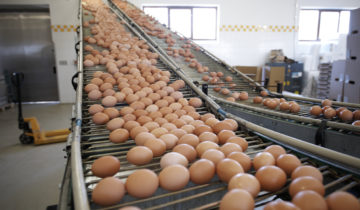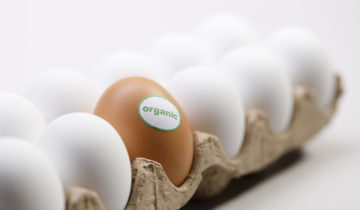Institutional catering and commercial restaurant diners are becoming increasingly mindful of product information: provenance, production conditions, nutritional qualities, etc. These considerations encompass the products’ impact on both health and the environment. The products used by chefs must therefore satisfy all these expectations, because appreciating what we eat also involves our perceptions of the quality of our food. Food service professionals also have to take their suppliers’ technical capacities and commitments into account, which is why the choice of suppliers is important to promoting the food they serve.
In the beginning: Farms
Eggs are classified based on size, laying date and type of farm. Code 3, referring to caged chickens, once accounted for the vast majority of eggs, ahead of all alternative farming methods: cage-free (Code 2), free-range (Code 1) and organic (Code 0). Nowadays though, European production is split half and half between caged and alternative farming, with a decline in the proportion of Code 3 eggs over the years. Consumers are increasingly attentive to production conditions, including the chicken’s feed and welfare. For this reason, the farming method should be taken into consideration when choosing a supplier, so it can then be communicated to diners.
From good products to good processing
Although in countries like France they are banned in whole form in professional kitchens, due to the associated health risks, eggs remain essential ingredients for many recipes, which is why liquid egg is one of the most popular products amongst restaurateurs. Egg-based products like omelettes can also save kitchen crews precious time. Consequently, processing offers a multitude of benefits. The proximity of a co-operative’s farms to its industrial units minimizes the processing time for fresh eggs (less than 28 days old) and even extra-fresh eggs (less than 9 days old). This ensures healthy egg products with superior sensory qualities.

Trusted suppliers
The needs of the dining and institutional catering sectors continue to grow, in terms of both quantity and quality. Agri-food actors must now meet this demand. A co-operative organization guarantees both the quantity and consistent quality of supplies, minimizing the risk of a stock outage on the supply chain. Functioning without any intermediaries, the farmers are able to deliver precise quantities, calibrated to the processing units. In return, technical monitoring of the producers allows them to improve their farms and boost their skills.
In addition, because they belong to their farmers, co-operative brands guarantee they will be fairly paid. Social considerations are an integral part of a product’s value and can also be used to promote the product to customers.
The choice of suppliers for restaurants and institutional catering should be of benefit to both those professionals and their diners. This means looking at multiple criteria: the supplier’s ability to provide the desired quantities of product, at a consistent quality level, as well as the supplier’s social and environmental impact. Cocotine ticks all those boxes!
Take a look at our infographic showing our assessment of alternative farming in Europe
Quelle est la répartition des élevages alternatifs et bio en Europe ? Découvrez le dans notre infographie






